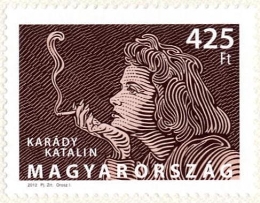
1. MAGYAR - MAGYAR ELŐADÓMŰVÉSZEK II. - KARÁDY KATALIN - Bélyeg rendelési kód: 2012 év bélyegei kompletten
2. ENGLISH - HUNGARIAN PERFORMERS III - Order code of the stamp: 2012 Year stamps complete
1. MAGYAR - MAGYAR ELŐADÓMŰVÉSZEK II. - KARÁDY KATALIN
Alkalmi bélyeg Karády Katalin és Várkonyi Zoltán emlékére
A Magyar Posta jeles magyar előadóművészek sorozatának legújabb darabjai Karády Katalin színésznő, énekesnő és Várkonyi Zoltán színész, filmrendező, színigazgató születésének 100. évfordulójára emlékezik. A kiadványok Orosz István Kossuth-díjas grafikusművész tervei szerint a Pénzjegynyomdában készültek. A bélyegsorozatot Bakati Gábor vezérigazgató-helyettes bocsátotta forgalomba a Kecskeméti Katona József Színházban tartott Színházi Világnapi Gála alkalmával.
Karády Katalin színészi tanulmányait követően 1939–41 között a Pesti és a Vígszínházban lépett fel. Már első mozifilmje, a Halálos tavasz bemutatása után a kor ünnepelt dívája lett. Kilenc év alatt húsz filmfőszerepben láthatta őt a közönség. A német csapatok bevonulását követően dalait letiltották és 1944-ben kémkedés vádjával a Gestapo le is tartóztatta. A legnehezebb időkben is ember tudott maradni, vállalva az életveszélyt, zsidó gyerekeket mentett meg a biztos haláltól. Humanista nagysága előtt 2004-ben a jeruzsálemi Jad Vasem Intézet a Világ Igaza kitüntetéssel tisztelgett. 1945–48 között az Operettszínház foglalkoztatta még, de a kommunista hatalom ellehetetlenítette, 1949-től pedig be is tiltotta filmjeit és többé színházban sem léphetett fel. 1951-ben végleg elhagyta Magyarországot. Salzburg, Svájc és Brüsszel után São Paolóba költözött majd 1968-ban New Yorkban telepedett le. Bár vállalt néhány fellépést, és lemezei is jelentek meg, haláláig visszavonultan élt.
Várkonyi Zoltán Kossuth-díjas, érdemes és kiváló művész; színész, filmrendező és színházigazgató Ódry Árpád és Kiss Ferenc tanítványaként végzett 1934-ben a Színiakadémián. 1934-41 között a Nemzeti, 1941-44 között pedig a Madách Színház tagja volt. A háború alatt a színpadról letiltották, és származása miatt menekülnie kellett a Gestapo elől. A háború után 1945-től a Művész Színház igazgatója. 1950-62 között a Nemzeti Színház művésze, és három évadon keresztül a Magyar Néphadsereg Színházának főrendezője. 1962-ben a Vígszínház főrendezője, majd 1971-től egészen haláláig igazgatója. Filmszerepeivel párhuzamosan rendezőként magyar klasszikus filmek sorát forgatta le. 1949-től tanított a Színész Akadémián (később Színház és Filmművészeti Főiskola), 1972-től egészen haláláig rektorként vezette az intézményt.
(Forrás: szineszkonyvtar.hu • hu.wikipedia.org)
Forrás: Posta
2. ENGLISH - HUNGARIAN PERFORMERS III - KATALIN KARÁDY
The latest stamps in Magyar Posta’s series of outstanding Hungarian performing artists commemorate the centenary of birth of the actress and singer Katalin Karády, and the actor and film and stage director Zoltán Várkonyi. The stamps were made by printing company Pénzjegynyomda based on the design of the Kossuth Prize winning graphic artist István Orosz. The set of stamps was officially released at the World Theatre Day Gala in the Katona József Theatre in Kecskemét by deputy CEO Gábor Bakati.
After completing her drama studies, Katalin Karády appeared at two theatres in Budapest (Pesti Színház and Vígszínház) between 1939 and 1941. She became the celebrated diva of the age after her first motion picture, Deadly Spring, was released. She played the title role in twenty films over nine years. After German troops occupied Hungary, her songs were banned and in 1944 she was arrested by the Gestapo on charges of spying. Even during the most difficult times she retained her humanity and dignity, and, risking her own life, saved Jewish children from certain death. The Yad Vashem Institute in Jerusalem honoured her extraordinary compassion by awarding her the title Righteous Among the Nations in 2004. Between 1945 and 1948 she played at the Operetta Theatre in Budapest, but the communist authorities made her work impossible. Her films were banned in 1949 and she could no longer appear on stage. In 1951 she left Hungary forever. She spent some time in Salzburg, Switzerland, Brussels and São Paolo before settling in New York in 1968. Although she did appear on a few occasions and released some records as well, she lived in seclusion until her death.
Zoltán Várkonyi, winner of the Kossuth Prize, Artist of Excellence and Artist of Merit, actor, film and stage director, studied under Árpád Ódry and Ferenc Kiss before graduating from the Academy of Drama in 1934. He was a member of the National Theatre between 1934 and 1941 and the Madách Theatre between 1941 and 1944. He was banned from performing on stage during the war and had to flee from the Gestapo because of his origins. After the war, he was the manager of the Művész Theatre from 1945. Between 1950 and 1962 he worked at the National Theatre and for three seasons was the main director at the Hungarian People’s Army Theatre. In 1962 he became the main director at the comedy theatre Vígszínház and was the manager there from 1971 until his death. In parallel with his film roles he directed a series of classic Hungarian films. He taught at the Academy of Drama (later the Academy of Theatre and Film), and was the rector of the institution from 1972 until his death. (Source: szineszkonyvtar.hu • hu.wikipedia.org)










